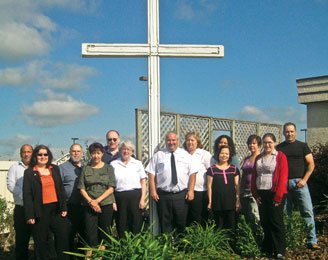 If Major Roy Bridger, executive director of The Salvation Army's Addictions and Residential Centre (ARC) in Edmonton, needs to remind himself of the program's success, he only has to look across the conference table to Joe McCharles, the maintenance manager.
If Major Roy Bridger, executive director of The Salvation Army's Addictions and Residential Centre (ARC) in Edmonton, needs to remind himself of the program's success, he only has to look across the conference table to Joe McCharles, the maintenance manager.
Three years ago, Joe came to ARC straight from prison. A crack cocaine addict, he lost his wife and his home, and ended up living on the streets of Edmonton for a year. Arrested and released from prison, he was court-ordered to attend the Anchorage, a Salvation Army addiction treatment program for men and women. “I didn't want to be there,” he says now, “but something changed in me after a month.” He was able to finish at the Anchorage and eventually began working at The Salvation Army. “ARC's been a tremendous blessing for me in my recovery.”
Joe started out in the maintenance department as one of the employees. Now he is the maintenance manager. In that capacity, he prays with his staff at the start of the day. “He spends as much time counselling his staff as he does managing them,” says Major Bridger.
More Than a Place to Stay
The Edmonton ARC has offered addiction services—residential and community-based—to Edmonton and surrounding area since the early 1900s. In recent years, the facility has gone through an exciting period of transformation. “We look at our buildings as more than just bricks and mortar,” explains Major Bridger. “Instead, we see them as havens of hope that hold out opportunities for changing lives. We believe that the people we serve all have the potential to become productive citizens.”
The ARC consists of a single men's residence, a men's supportive residence, the Anchorage, and the Keystone and Cornerstone apartments for those in recovery. But when Major Bridger came on staff two years ago, he noticed a disconnect between the hostel and addictions staffs.
“There seemed to be a silo effect between the departments, with little co-operation,” he observed. Under Major Bridger's direction, the philosophy of the centre has changed. “Our attention has turned to the client and resident,” Major Bridger states. “Recognizing their potential is the number-one focus of what we do.” Staff have grasped the concept. Partnerships have developed between the addictions and hostel staffs, and this spirit of collegiality has taken root.
“Word has spread,” Major Bridger says. “Previously, the people that came to us off the street were looking for a place to stay. Now they come in with higher expectations—believing that we're going to do more for them.”
New Hopes, New Beginnings
“We're trying to get away from the idea of client and resident by using the term guest,” continues Major Bridger. “A client or a resident could be a long-term person; a guest is someone who comes for a short time.” More than that, a guest is someone you welcome and serve, someone with a human face, who is more than a statistic.
Guests are strongly encouraged to find work or go to school. Weekly on-site meetings with counsellors are mandatory, and classes are given in life skills, anger management, budgeting and financial issues. The courses are all designed to get people back into gainful employment.
“We don't want this to become a permanent home,” says Major Bridger. “ARC should be a place of transition, a place of renewal, a place of hope and new beginnings.”
The success of ARC's efforts has not gone unnoticed in the community. “People are looking at this facility—and the Army and what it does—differently than they did a few years ago,” comments Major Bridger. “They are seeing the Army not only as a place to stay but a place that's helping people get re-established.”
“For me, it's all about changing lives,” concludes Major Bridger. “It's not about what I can do, because I can do nothing without God. Being able to take somebody off the street, to see God work in their life and the change that comes about—there are no words to describe that feeling.”
Forging Ahead
How partnerships in Canada and Bermuda are strengthening the international Salvation Army.
by Major Heather Matondo FeaturesInternational DevelopmentAdvancing the mission of the international Salvation Army through partnerships in Canada and Bermuda.
Building a Better World Together
The Salvation Army celebrates International Development Week.
by Kyle Mangio FeaturesFrom February 1-7, 2025, the international development department holds a vibrant and immersive open house in honour of International Development Week, transforming their space at The Salvation Army’s territorial headquarters in Toronto into a lively, global showcase brimming with stories, laughter and hope.
A Lenten Pathway to Right Relationships
Walking softly with the United Nations Declaration on the Rights of Indigenous Peoples.
by Captain Crystal Porter FeaturesIn this Lenten season, we invite you to join us as we reflect on the wisdom of Scripture, listen to the voices of Indigenous Peoples and practise lament, using a new resource created by the territorial Indigenous ministries department: “Walking Softly With the Declaration: A Lenten Pathway to Right Relationships.”









Leave a Comment